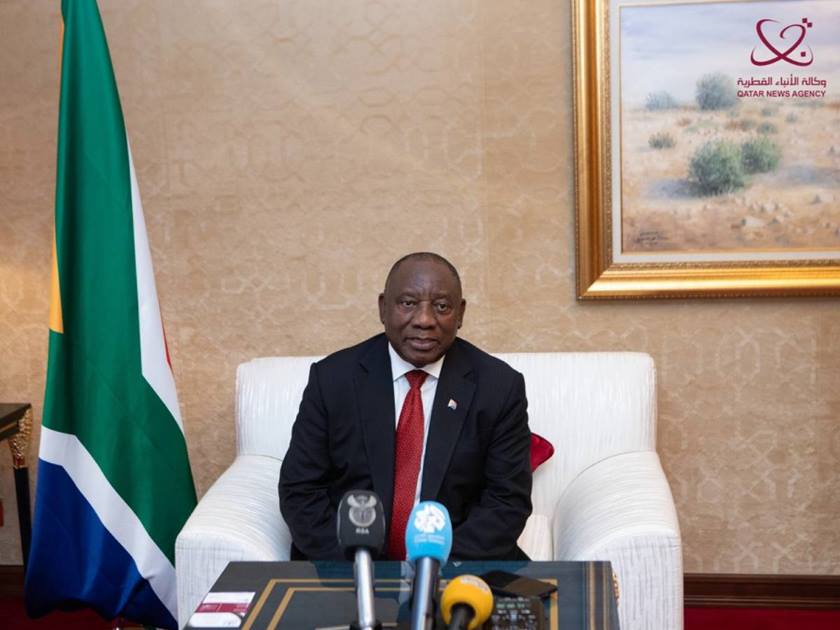In a meeting with Qatari officials, Ramaphosa drew parallels between the struggles of South Africa under apartheid rule and the plight of the Palestinians.
South Africa has submitted a referral to the International Criminal Court (ICC) to investigate Israel’s war crimes in Gaza, South Africa’s President Cyril Ramaphosa revealed during a press briefing in Qatar on Wednesday.
The decision comes as South African legislators were anticipated to discuss a proposal on Thursday, urging the shutdown of the Israeli Embassy in South Africa and the severance of all diplomatic relations with the regime until an agreement for a cease-fire is reached.
Ramaphosa asserted that South Africa holds the belief that Israel is engaging in war crimes and genocide in Gaza, where over 11,500 Palestinians have been killed, and essential facilities like hospitals and public infrastructure destroyed.
“As South Africa we have accordingly, together with many other countries across the world, referred this whole Israeli government action to the International Criminal Court,” Ramaphosa said Wednesday during a state visit to Qatar.
“We have put through a referral because we believe that war crimes are being committed there. And of course, we do not condone the actions that were taken by Hamas earlier, but similarly, we condemn the actions that are currently underway and believe that they warrant an investigation by the ICC,” he added.
The African National Congress (ANC), under Ramaphosa’s leadership, announced it would endorse the motion proposed by the leftist opposition party, Economic Freedom Fighters. The motion calls for the closure of the Israeli Embassy in the country and the cessation of diplomatic relations with Israel.
During his two-day visit to the Gulf nation, Ramaphosa also lauded Qatar for its instrumental role in mediating amid the relentless Israeli war on Gaza.
Qatar, which hosts a Hamas political office, has taken the lead in mediating discussions between the group and Israeli authorities, specifically focusing on civilian captives.
Hamas captured some 242 Israelis and foreigners during the ‘Al Aqsa Flood’ operation on October 7, in which the Palestinian group managed to infiltrate occupied territories through air, land and sea.
So far, Qatari mediation has led to the release of four captives before talks appeared to stall due to the intensifying Israeli bombardment.
Addressing the media in Qatar, Ramaphosa expressed deep concern over the ever-escalating war in Gaza, condemning the transformation of the enclave into what he described as a detention camp marred by an unfolding genocide.
“He highlighted the transformation of Gaza into a detention camp where genocide is taking place, saying that South Africa declared its position of opposing the ongoing operation, especially as it is now targeting hospitals, where children and women, adding that scores of the wounded are dying and that preserving life is no longer a reality, that it is being completely ignored and set aside,” Doha’s news agency reported.
As Israel’s relentless war on Gaza enters its 41st day, the death toll in Gaza has risen to over 11,500 Palestinians, including 4,710 children, according to the government media office in Gaza.
The South African leader called attention to the urgent need for international intervention, asserting that South Africa, in solidarity with many countries globally, deems it appropriate to refer the actions of the Israeli government to the ICC.
“The events in Palestine, and the growing deaths of civilians, particularly children, grieves us all,” stated President Ramaphosa, emphasising the significance of his visit as an opportunity to strengthen bilateral relations with Qatar and share perspectives on recent international developments.
“South Africa supports all efforts to secure an immediate and full ceasefire, with talks on a political solution to address the legitimate aspirations of the Palestinian people for statehood,” he added.
In a meeting with Qatari officials, Ramaphosa drew parallels between the struggles of South Africa under apartheid rule and the plight of the Palestinians.
“As South Africans, what the Palestinians are going through is something that we have lived through. We struggled for 82 years before attaining our freedom. The Palestinians have been under occupation for 75 years, and they’ve been struggling for many more years,” said Ramaphosa.
“We are going to continue supporting the Palestinians, and we are pleased to find that Qatar supports the cause of the Palestinians. That is why we applauded and commended his highness [Sheikh Tamim bin Hamad Al Thani] for the stance that he has taken.”
“Because of the position that we’ve taken, we are also called upon to participate in finding a solution, and that is in our nature, as South Africa, that wherever there are conflicts we always call for peace,” he added.
Parallels drawn
Comparing Israel to South Africa overlooks two key factors: the nature of the Israeli regime and the intricate dynamics of its apartheid model. Human rights reports suggest that Israel’s apartheid system emerged after failing to withdraw from the 1967 borders and allow a Palestinian state, The New Arab news site reported.
Apartheid, according to Palestinian intellectuals, is inherent in the exclusionary, settler-colonial nature of Zionism. The establishment of Israel involved ethnic cleansing and the confinement of Palestinians within pre-1948 borders, framing Zionism as “racial elimination”.
The comparison with South Africa reveals striking similarities but also exposes more oppressive measures by Israel. Palestinians face restrictions on work, movement, and collective punishment through labour permits and security checks. Separate road networks in the West Bank serve Israeli settlers and usurp Palestinian land, reports said.
Unlike South Africa, Palestinians experience a blend of settler-colonialism and hyperactive military occupation, leading to daily exposure to violence, dispossession, and evolving oppressive measures. While South Africa’s white minority eventually faced international pressure, the odds against Israel’s apartheid makes expecting an identical trajectory unrealistic.
As Israel’s apartheid evolves, so do Palestinian resistance methods and international solidarity efforts.
The current system’s unravelling remains uncertain, but history’s logic suggests that normalising apartheid is unlikely.







